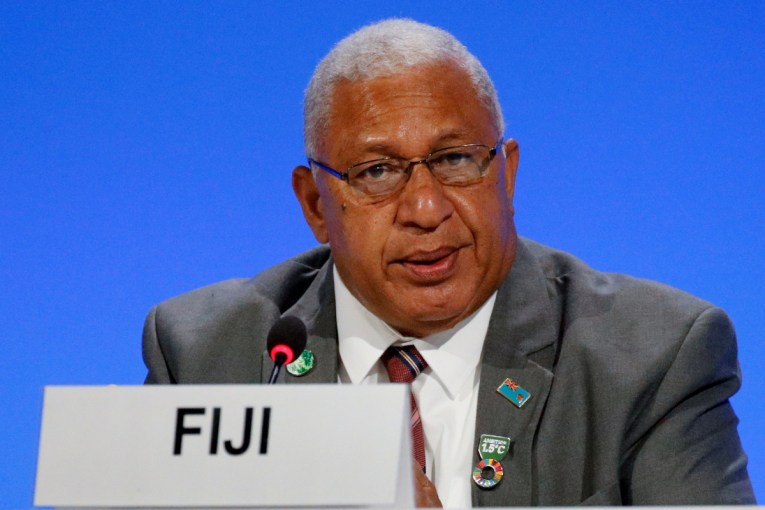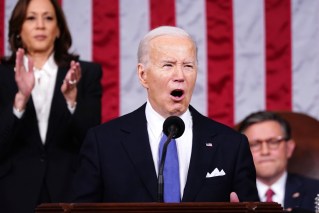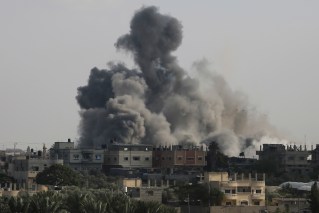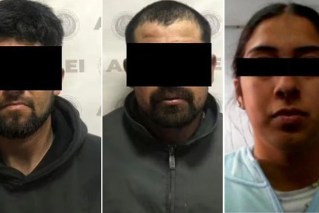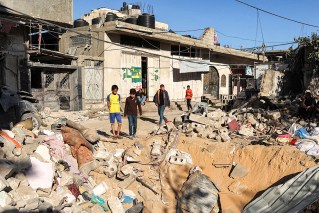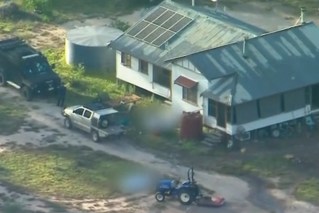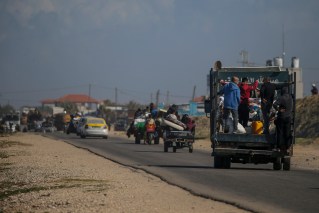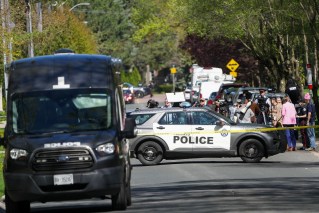US: Syria may still have chemical weapons, but air strikes will make Assad ‘think long and hard’

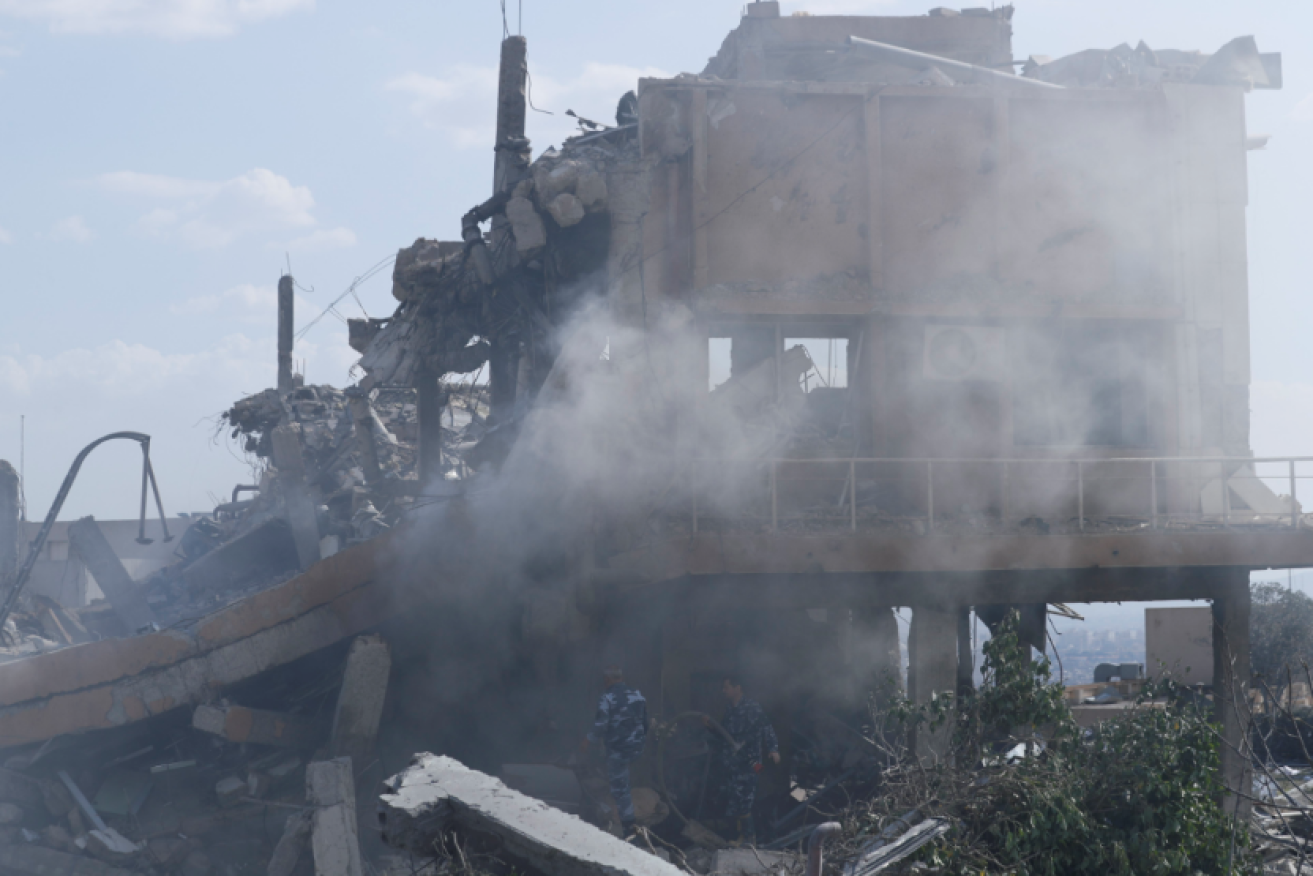
Only rubble is left of the the Scientific Research Center, a chemical-weapons lab in the heart of Damascus. Photo: AP/Youssef Badawi
The US has hailed the massive wave of airstrikes against Syria targets as an overwhelming success – but officials cautioned there are no guarantees President Bashar al-Assad’s chemical weapons infrastructure has been completely neutralised.
At a Pentagon briefing, director of the Joint Chiefs Lieutenant General Kenneth F McKenzie said the strikes were precise, overwhelming and effective, but that some of Syria’s chemical capacity remained.
“I think we’ve dealt them a severe blow,” he said. “[But] I would say there’s still a residual element of the Syrian program that’s out there.
“I’m not going to say that they’re going to be unable to continue to conduct a chemical attack in the future. I suspect, however, they’ll think long and hard about it.”

Before and after images from the Him Shinshar chemical weapons depot. Photo: Pentagon
Russia has warned the United States there will be “consequences” for military strikes on chemical weapons sites in Syria in response to last week’s suspected poison gas attack.
The attacks have further inflamed relations with Russia, which launched a failed bid to have the UN condemn the attacks.
Russian Ambassador Anatoly Antonov said on Twitter that “a pre-designed scenario is being implemented”.
“Again, we are being threatened. We warned that such actions will not be left without consequences.”
“Insulting the President of Russia is unacceptable and inadmissible,” he added.
US, British and French forces pounded chemical weapons sites in Syria in a massive and co-ordinated assault in response to the alleged gas attack which last week reportedly killed about 40 people in the rebel-held town of Douma.
A perfectly executed strike last night. Thank you to France and the United Kingdom for their wisdom and the power of their fine Military. Could not have had a better result. Mission Accomplished!
— Donald J. Trump (@realDonaldTrump) April 14, 2018
In a televised address to the nation, US President Donald Trump said the three nations had “marshalled their righteous power against barbarism and brutality”.
The strikes were the biggest intervention by Western powers against President Bashar al-Assad in the country’s seven-year civil war, which has pitted the US and its allies against Russia.
Earlier, Russian Foreign Minister Sergei Lavrov said the suspected chemical attack in Douma was fabricated and that Russian experts had inspected the site of the alleged attack and found no trace of chemical weapons.
He said Moscow had “irrefutable information that it was another fabrication”.
“God forbid anything adventurous will be done in Syria following the Libyan and Iraqi experience,” Mr Lavrov said.

A B-1 bomber takes on fuel before heading to a target in Syria. Photo: Pentagon
The big unknown is what Russia will do in response.
Liberal senator and former general Jim Molan expects Russia to retaliate in some as-yet undisclosed way.
“There’s no way in the world this is the end of the activity because that’s up to the Russians,” Senator Molan told Nine on Sunday.
Russia failed in its bid to have the United Nations condemn the air strikes, which Senator Molan described as “very appropriate” and precise.
“Why didn’t you wait for the outcome of the investigation you called for?” Russia’s UN Ambassador Vassily Nebenzia said after the vote.

Russian UN ambassador Vassily Nebenzia sees his bid to have the world body condemn the air strikes go down in flames. Photo: AP: Mary Altaffer
Accusing the US, France and the UK of “demonstrating a blatant disregard for international law”, he told reporters “I hope hot heads will cool down.”
There was no hint, however, that the Trump administration is ready to step down.
At the emergency meeting of the UN Security Council, US ambassador Nikki Haley warned that further strikes were inevitable if chemical attacks continued.
“I spoke to the President this morning and he said, ‘If the Syrian regime uses this poisonous gas again, the United States is locked and loaded’,” Ms Haley told the meeting.
“When our President draws a red line, our President enforces the red line.”
The Pentagon said the strikes targeted a research centre in Damascus, along with a chemical weapons storage facility and command post west of Homs.
In a televised address from the White House Diplomatic Reception Room on Saturday (Friday evening local time), President Trump said: “A short time ago, I ordered the United States Armed Forces to launch precision strikes on targets associated with the chemical weapons capabilities of Syrian dictator Bashar al-Assad.”
He announced a combined American, British and French response to the “recent atrocities which will integrate all instruments of our national power – military, economic, and diplomatic”.
CNN reported that US aircraft – including B-1 bombers – and ships were used in the attack, according to multiple US defence officials, and at least one navy warship based in the Red Sea was involved.

A British Tornado prepares to play its part in the massive attack. Photo: EPA/L. Matthews
US Defence Secretary James Mattis said the 100 air strikes were a “one time shot” to send a strong message to Syrian President Bashar al-Assad, selecting targets that would minimise the risks to innocent civilians.
In a joint press conference, Mr Mattis and Marine General Joseph Dunford said three main chemical weapons facilities were targeted by both missiles from the sea and fired from aircraft, which triggered Syrian air defences.
#BREAKING: @DeptOfDefense briefing on #SyriaStrikes https://t.co/52TheJhJSd
— U.S. Navy (@USNavy) April 14, 2018
“We specifically identified these targets to mitigate the risk of Russian forces being involved,” General Dunford told reporters, adding the US military advised Russia of airspace that would be used in the strike but did not “pre-notify them”.
The Pentagon said one of the targets was a scientific research centre located in the greater Damascus area, which it said was involved in the development, production and testing of chemical and biological weaponry.
The second target was a chemical weapons storage facility west of the city of Homs.

Targets included a scientific research centre in the greater Damascus area. Photo: AAP
“We assess that this was the primary location of Syrian sarin and precursor production equipment,” General Dunford said.
The third target, which was also near Homs, contained both a chemical weapons equipment storage facility and a command post.
The Pentagon could not confirm how many missiles hit their targets.
Mr Trump said the combined operation would continue: “We are prepared to sustain this response until the Syrian regime stops its use of prohibited chemical agents.
“The evil and the despicable attack left mothers and fathers, infants and children, thrashing in pain and gasping for air. These are not the actions of a man, they are crimes of a monster,” Mr Trump said.
— Donald J. Trump (@realDonaldTrump) April 14, 2018
A US official told Reuters the strikes were aimed at multiple targets and involved Tomahawk cruise missiles as Syrian state TV said the army’s air defences were confronting the attack.
At least six loud explosions were heard in Damascus on Saturday and smoke was seen rising over the Syrian capital, a Reuters witness said.
British Prime Minister Theresa May said it was the first time she, as PM, had had “to take the decision to commit our armed forces in combat – and it is not a decision I have taken lightly”.
Ms May said the strikes were not about regime change or intervening in a civil war.
”It is about a limited and targeted strike that does not further escalate tensions in the region and that does everything possible to prevent civilian casualties,” Ms May said.
“I have done so because I judge this action to be in Britain’s national interest. We cannot allow the use of chemical weapons to become normalised – within Syria, on the streets of the UK, or anywhere else in our world.”
French President Emmanuel Macron said he ordered the attacks after the “massacre” of innocent people which had breached “a red line”.
Le samedi 7 avril 2018, à Douma, des dizaines d’hommes, de femmes et d’enfants ont été massacrés à l’arme chimique.
La ligne rouge a été franchie.
J’ai donc ordonné aux forces armées françaises d’intervenir. https://t.co/Vt9LcFcFzH pic.twitter.com/Dc726PHfAR— Emmanuel Macron (@EmmanuelMacron) April 14, 2018
Prime Minister Malcolm Turnbull said the strikes were “a calibrated, proportionate and targeted response”.
“The use of chemical weapons by anyone, anywhere, under any circumstances is illegal and utterly reprehensible. The Assad regime must not be allowed to commit such crimes with impunity,” Mr Turnbull said in a statement on Saturday.
Mr Turnbull called out Russia, who he said must not obstruct UN Security Council responses to the use of chemical weapons in Syria.
“Russia and Syria’s other main supporter, Iran, must place pressure on the regime to end its abuse of international law and human right,” he said.
“[They must] engage seriously in negotiations to bring the seven year civil war to an end.
”To Iran and to Russia, I ask: What kind of a nation wants to be associated with a mass murder of innocent men, women and children?
“The nations of the world can be judged by the friends they keep. No nation can succeed in the long run by promoting rogue states, brutal tyrants and murderous dictators.”
Earlier on Saturday (Friday local time) the White House accused Syria of carrying out a toxic gas assault on April 7 that killed at least 60 people in Douma, near Damascus.
Spokeswoman Sarah Huckabee Sanders told reporters: “We have a very high confidence that Syria was responsible and, once again, Russia’s failure to stop them and their continued (lack of action) on this front has been part of the problem.”
The US State Department said the United States has proof at “a very high level of confidence” that the Syrian government carried out the attack but is still working to identify the mix of chemicals used.
Mr Trump said “no amount of American blood or treasure can produce lasting peace and security in the Middle East”.
“We cannot purge the world of evil or act everywhere there is tyranny or a troubled place. We will try to make it better.”
Mr Trump concluded his announcement by saying the nations of Britain, France and the United States of America “have marshalled their righteous power against barbarism and brutality”.
“Today I ask all Americans to say a prayer for our noble warriors and our allies, as they carry out their missions. We pray that God will bring comfort to those suffering in Syria. We pray that God will guide the whole region toward a future of dignity and of peace,” he said.
On Wednesday, Mr Trump warned that missiles “will be coming” in response to the Douma incident. Russia told the United States and its allies not to carry out any military strike.
Chemical weapons experts for the Organisation for the Prohibition of Chemical Weapons (OPCW) arrived in Syria to investigate the suspected poison gas attack.
The investigators, who are only mandated to determine if chemical weapons were used and not who used them, were expected to start their investigations into the Douma incident on Saturday, the Netherlands-based organization said.
Asked whether the United States was waiting for the OPCW’s report before it made a decision on Syria, State Department spokeswoman Heather Nauert said: “We believe we know who is responsible for this. We know a chemical weapon was used.
“The OPCW will still formulate its facts but the OPCW does not determine the responsibility. They just determine the substance,” Ms Nauert added.
-with agencies
